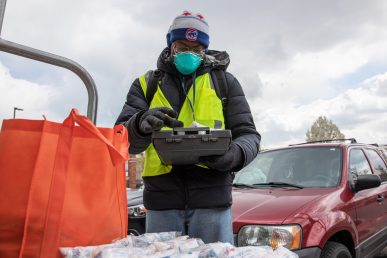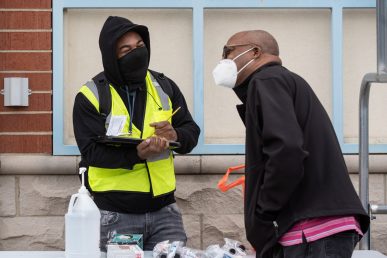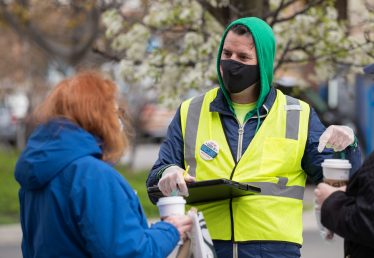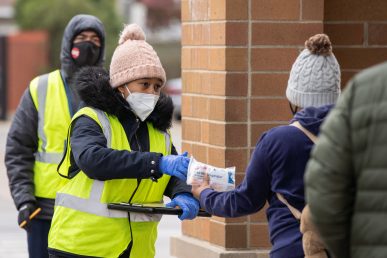Project pairs COVID-19 outreach with job creation
When the call went out for a hyper–impact team focused on COVID-19 testing and vaccinating high-risk communities, members of the University of Illinois Chicago School of Public Health took the opportunity to go beyond outreach. They also built job opportunities.
Brenikki Floyd, a clinical assistant professor in Community Health Sciences, and Edgar Gutierrez, project coordinator for UIC’s Community Outreach Intervention Projects, developed a program that not only provides COVID-19 outreach, but also creates jobs for those whose employment was affected by the pandemic.
By working with several other community organizations and national partnerships, UIC received funding to build a COVID-19 Street Outreach Team. The hiring process began in September 2020. By February 2021, a team of 15 street outreach specialists and four street outreach supervisors were hired and trained to deliver information on COVID-19 testing, vaccinations and distribute personal protection equipment to Chicago’s neighborhoods at high risk for COVID-19 infection.
The team, most of whom never worked in public health before, all come from the Chicago communities they are serving.
“They had no experience in public health and never thought their perspective was valuable,” Gutierrez said.
The team does more than pass out information. It researches which neighborhoods to visit based on the City of Chicago’s COVID-19 data dashboard, which shows areas that have high COVID-19 positivity rates and low testing rates. Once neighborhoods are identified, the team visits the area to locate high foot-traffic areas where they can conduct outreach. Team members also collect demographics and COVID-19 status data on their interactions with individuals in the community.
The outreach specialists also are learning about new career possibilities, learning about public health and UIC, and considering ways to rewrite their narratives, Gutierrez said.
“We’re helping them build capacity, not just a job,” Floyd said.
Several outreach specialists agreed. They shared their thoughts during an outreach visit to the North Mayfair neighborhood on the city’s Northwest Side recently.

Jamaal Fridge, a COVID-19 outreach team supervisor, stocks up on outreach forms and care kits as the team set out to survey the Mayfair neighborhood on Wednesday, April 21, in Chicago. (Joshua Clark/University of Illinois Chicago)
‘I feel like I can do anything’
Jamaal Fridge had spent six years teaching English in China, a job he left in March 2020 just after COVID-19 hit. He then took temporary jobs as a U.S. Census worker, an Amazon warehouse worker, and a COVID-19 contact tracer. He began as a UIC COVID-19 street outreach supervisor in December as an intern, shadowing Gutierrez.
Fridge, a team supervisor, said it has been rewarding to see the difference they are making. The team shared space with several other service organizations on the city’s West Side, educating people about COVID-19 as other groups passed out food and provided a needle exchange.
After the team’s frequent visits, the area saw its COVID-19 positivity rate drop from 14% to 2.5%, he said.
Even though Fridge holds a bachelor’s degree in business administration, his experience with the outreach team is his first time in a management role. The author of a children’s book, Fridge would like to become a grant writer.
“I’ve developed critical-thinking skills,” he said. And, after working with the team, he said, “I felt like I can do anything.”

Armani Lee, a COVID-19 outreach supervisor, talks to a Mayfair resident outside the neighborhood Petco on Wednesday, April 21, in Chicago. (Joshua Clark/University of Illinois Chicago)
‘I think I have a niche for this’
Armani Lee, a team supervisor, was making progress passing out PPE kits and having conversations with people at a table outside of a Petco store.
“That young man is doing a great job. He is excellent,” a man called out as he got into his car after chatting with Lee.
Lee said he has found this job empowering. “People are always expressing my strengths to me. I think I have a niche for this,” he said.
Lee, who is a COVID-19 survivor, had worked in restaurants and kitchens prior to the pandemic. Outreach work was new to him. He has enjoyed engaging with people and has been surprised to find out how open people are to getting vaccinated. He said he has signed up 15 people for vaccinations since he began in March.
After this temporary assignment ends, Lee said he plans to pursue his own entrepreneurial business.
“The skills I learned on this project will 100% help me in the future,” he said.

Vino Mazzei, COVID-19 outreach supervisor, surveys Chicagoans as they leave a Starbucks in the Mayfair neighborhood on Wednesday, April 21, in Chicago. (Joshua Clark/University of Illinois Chicago)
‘I’m qualified for that’
“I’ve never had a job that I’ve loved this much,” Vino Mazzei said.
A classical singer who performed in churches, Mazzei was used to having side jobs as a waiter or delivering pizzas. But, when COVID-19 hit, he said he knew he had to do more. He had some experience working tables at community events, so when he saw the outreach opportunity, he thought, “I’m qualified for that.”
Helping to fill in health disparity gaps is important to him, he said, and he has been surprised by how well-received he has been.
“People are very encouraging and most do want to get vaccinated and take the PPE,” he said.
“Being out here and talking to people about COVID, gets on their minds. Even if they don’t agree to get vaccinated today, at least it’s on their minds.”
This work has been life-changing for him, he said. He’s looking at pursuing full-time work in the public sector.

Erica Thornton, a COVID-19 outreach specialist, hands out masks as she surveys Chicagoans outside a Walgreens in the Mayfair neighborhood on Wednesday, April 21, in Chicago. (Joshua Clark/University of Illinois Chicago)
‘I knew I wanted to help’
Urban farmer Erica Thornton lost her job when COVID-19 shut down the restaurants and farmer’s markets, the farm’s main customers. She took the outreach specialist opportunity to do her part to end the pandemic.
“I knew I wanted to help with the efforts in our community,” Thornton said. She said she has been surprised by how open people have been about their vaccine conspiracy theories and other resistance to the vaccine. She counters each one as they come.
“I say, ‘Would you rather have COVID or the vaccine?’”
Thornton takes the time to explain how high infection rates can affect those in neighborhoods where there are already a lot of people with co–morbidities that can give people worse outcomes if they get COVID-19.
“I would like to spend more time one-on-one with folks directly explaining why the vaccine isn’t ‘the mark of the beast’,” she said.
A sculptor by trade, she’d like to become a project manager – work that would allow her time for her art.
The UIC COVID-19 Street Outreach program has received funding and support from the U.S. Department of Labor, Disaster Recovery National Dislocated Worker Grants, and the Northside American Job Center, which is working with UIC to provide career and business services to the workers. The focus is to offer employment and training services to the temporary workers once this funding ends. Additional assistance has come from the Chicago Cook Workforce Partnership.
